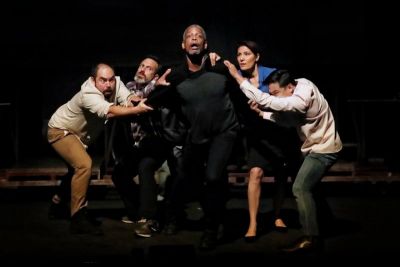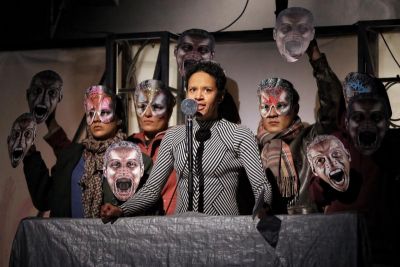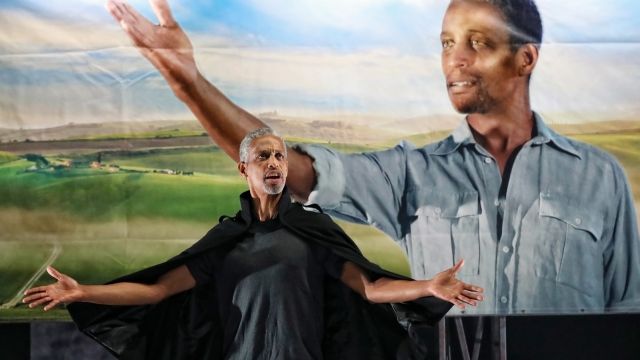Julius Caesar
The virtue of this pared back, ‘poor theatre’ production of Julius Caesar is its simplicity – and therefore its clarity. The cast is young – or seems young – and they wear what look like op-shop clothes – that is, an everyday hotchpotch of contemporary no style.
The cast is small, colour-blind and gender-blind, and there is some interesting doubling. The citizens of Rome, swayed this way and that by the forces at play, are represented (after scene 1) by most evocative bursts of music and sound from sound designer Nate Edmondson. Verity Hampson’s lighting is simple: most of the time she lights the downstage and fades into gloom upstage. The otherwise totally bare playing space is dominated by a structure of scaffolding, steps and platforms that can stand in for rostra, podia, Brutus’ home or battlefield tent.
Some of these decisions by director James Evans and designer Anna Tregloan have to do, no doubt, with this being a touring production. (After Melbourne, the play will be performed in twenty-six (!) more venues, the last being the Sydney Opera House in October-November.) It also seems to by intended for schools audiences and so has to be ‘relatable’ – but need that mean quite so ordinary and every day? Indeed, as the play began, it did look like a high school production rehearsal – and it took a while to dispel that impression. Other decisions are a mix of intriguing – in that they throw new light on the text – or sometimes puzzling.
 For instance, Ivan Donato’s Brutus, in rumpled trousers and untucked shirt, is not the usual aristocratic overthinker, but instead a rather chunky, genial ordinary sort of bloke. This is interesting (and it works), but rather diminishes Brutus’ tragedy and reduces the drama of his being drawn into the assassination plot and then having to justify it. Nick Simpson-Deeks speaks the verse with admirable clarity and attack, but there’s not much menace or malice to his Cassius. (The ‘lean and hungry look’ line is omitted.) Emily Havea seems awkward and unconvincing as Calphurnia but shines as the smug future dictator Octavius. An irrepressible Ghenoa Gela plays Casca for laughs – and gets them too: she’s terrific, very entertaining and a wonderful clown - so we almost forget that this not at all Shakespeare’s Casca.
For instance, Ivan Donato’s Brutus, in rumpled trousers and untucked shirt, is not the usual aristocratic overthinker, but instead a rather chunky, genial ordinary sort of bloke. This is interesting (and it works), but rather diminishes Brutus’ tragedy and reduces the drama of his being drawn into the assassination plot and then having to justify it. Nick Simpson-Deeks speaks the verse with admirable clarity and attack, but there’s not much menace or malice to his Cassius. (The ‘lean and hungry look’ line is omitted.) Emily Havea seems awkward and unconvincing as Calphurnia but shines as the smug future dictator Octavius. An irrepressible Ghenoa Gela plays Casca for laughs – and gets them too: she’s terrific, very entertaining and a wonderful clown - so we almost forget that this not at all Shakespeare’s Casca.
Also puzzling is Kenneth Ransom’s Caesar. No doubt he is directed to play the role as he does, but this is no victorious military commander, no powerful incipient dictator, not such a threat that he must be assassinated to ‘save’ the republic. Instead, this Caesar is remote and almost pathetic. Do the people love him? Really? In the scene where Decius Cinna (Russell Smith) persuades Caesar to go to the Senate that day, over the warnings of Calphurnia, yes, Caesar is flattered, but Mr Ransom plays up the vanity so much that his Caesar looks like an easy mark, a dope, and the scene is comic, devoid of tension.
 Perhaps most interesting is Sara Zwangobani as Marc Antony. I can’t imagine a more radical departure from the usual depictions of this playboy opportunist. But Ms Zwangobani makes absolutely perfect sense of the ‘I come to bury Caesar, not to praise him’ speech, with every pause and emphasis in the right place and hitting every note that shows Marc Antony’s purpose.
Perhaps most interesting is Sara Zwangobani as Marc Antony. I can’t imagine a more radical departure from the usual depictions of this playboy opportunist. But Ms Zwangobani makes absolutely perfect sense of the ‘I come to bury Caesar, not to praise him’ speech, with every pause and emphasis in the right place and hitting every note that shows Marc Antony’s purpose.
It is difficult, at least for me, not to compare – unfairly - this low budget production with the superbly resourced London version from The Bridge Theatre seen via National Theatre Live (and reviewed here in April this year), also done in contemporary dress, but in which the relevance of the play is stark, chiefly in the depiction of the intellectual, elitist plotters against the populist leader being completely out of touch with ‘the people’ – and therefore creating a real dictatorship. That salient aspect of the text is not pointed up here. Perhaps it is there to be inferred. Shakespeare is rarely sympathetic to the lower orders and what we see in Julius Caesar is how easily they can be manipulated and bought off.
What we do get with this production is the play stripped to its essentials so that it can be clearly seen: there is much rhetoric but the story qua story is simple. As it tours and is seen by schools – if it is - it will undoubtedly provoke discussion of the characters’ motives and why the play matters now.
Michael Brindley
Photographer: Prudence Upton.
Subscribe to our E-Newsletter, buy our latest print edition or find a Performing Arts book at Book Nook.

